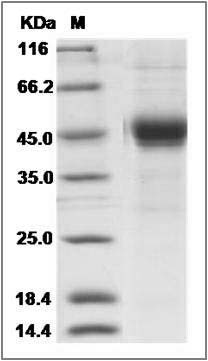-
Product Name
Rhesus BTLA (Fc Tag) recombinant protein
- Documents
-
Description
BTLA is a inhibitory molecule which belongs to the Ig superfamily. It down-modulates immune responses. As such, reagents that regulate the binding of BTLA to its ligand or alter BTLA signaling have significant therapeutic promise. BTLA is crucial to understand the mechanism(s) of action of these antibodies before attempting clinical applications. BTLA is not expressed by naive T cells, but it is induced during activation and remains expressed on T helper type 1 (T(H)1) but not T(H)2 cells. BTLA is a third inhibitory receptor on T lymphocytes with similarities to cytotoxic T lymphocyte-associated antigen 4 (CTLA-4) and programmed death 1 (PD-1).
-
Protein name
B-and T-lymphocyte attenuator isoform 1
-
Protein short names
A630002H24; CD272; B- AND T-LYMPHOCYTE-ASSOCIATED PROTEIN; B AND T LYMPHOCYTE ATTENUATOR; B- AND T-LYMPHOCYTE ATTENUATOR; BTLA1
-
Uniprot ID
G7MKA9
-
Gene Name
BTLA; EGK_11287
-
Source/Expression Host
Human Cells
-
Expression Plasmid/cDNA
A DNA sequence encoding the rhesus BTLA (EHH16054.1) (Met1-Leu155) was expressed with the Fc region of human IgG1 at the C-terminus.
-
Protein Species
Rhesus
-
Molecular weight
The recombinant rhesus BTLA comprises 366 amino acids and has a calculated molecular mass of 41.4 KDa.
-
Purity
> 90 % as determined by SDS-PAGE
-
Activity
Immobilized cynoBTLA-Fc at 10 μg/ml (100 μl/well) can bind biotinylated cynoTNFRSF14-Fc (Cat:504769), EC50 of biotinylated cynoTNFRSF14-Fc (Cat:504769) is 0.7-1.64 μg/ml.
-
Validations

Cynomolgus BTLA Protein (Fc Tag) SDS-PAGE
Related Products / Services
Please note: All products are "FOR RESEARCH USE ONLY AND ARE NOT INTENDED FOR DIAGNOSTIC OR THERAPEUTIC USE"
